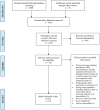A systematic review of the menstrual experiences of university students and the impacts on their education: A global perspective
- PMID: 34506544
- PMCID: PMC8432759
- DOI: 10.1371/journal.pone.0257333
A systematic review of the menstrual experiences of university students and the impacts on their education: A global perspective
Abstract
Background: Higher education attainment is linked to improved health and employment outcomes but the impact of university students' experiences of menstruation on their education is less clear. The objective of this review was to synthesise qualitative and quantitative research on university students' menstrual experiences and educational impacts.
Methods: Eligible studies were identified through systematic searching across eight peer-reviewed databases, websites for menstrual health organisations, grey literature databases, and reference lists of included studies. Eligible studies must have reported on at least one of the antecedents or components of menstrual experience outlined in the integrated model of menstrual experience in relation to university students or reported on the impact of their menstrual experiences on their education. Study characteristics and findings were extracted, analysed and presented as a narrative synthesis. The quality of evidence was assessed with the Mixed Methods Appraisal Tool. This study is registered on PROSPERO, number CRD42020178470.
Results: Eighty-three studies were eligible for inclusion. Most studies (n = 74; 89%) were quantitative and the highest proportion of studies were conducted in lower-middle-income countries (n = 31; 37%). Self-reported dysmenorrhea, other physical and emotional menstrual-related symptoms, and menstrual stigma contributed to negative menstrual experiences among female students. Very few studies considered the menstrual experiences of non-binary and transgender menstruating students, and culturally diverse students. Dysmenorrhea contributed to university absenteeism, impaired participation and concentration, and declining academic performance. Inadequate sanitation facilities for menstrual management and challenges containing menstruation also negatively impacted education.
Conclusions: Female university students' experiences of menstruation can negatively impact their education, highlighting the need for program and policy responses at university to improve students' wellbeing and educational engagement. Further research on the menstrual experiences of gender diverse, migrant and international students is needed as there is insufficient evidence to date.
Conflict of interest statement
The authors have declared that no competing interests exist.
Figures
References
-
- UNICEF. Guidance on menstrual health and hygiene. New York: 2019.
Publication types
MeSH terms
LinkOut - more resources
Full Text Sources
Medical



